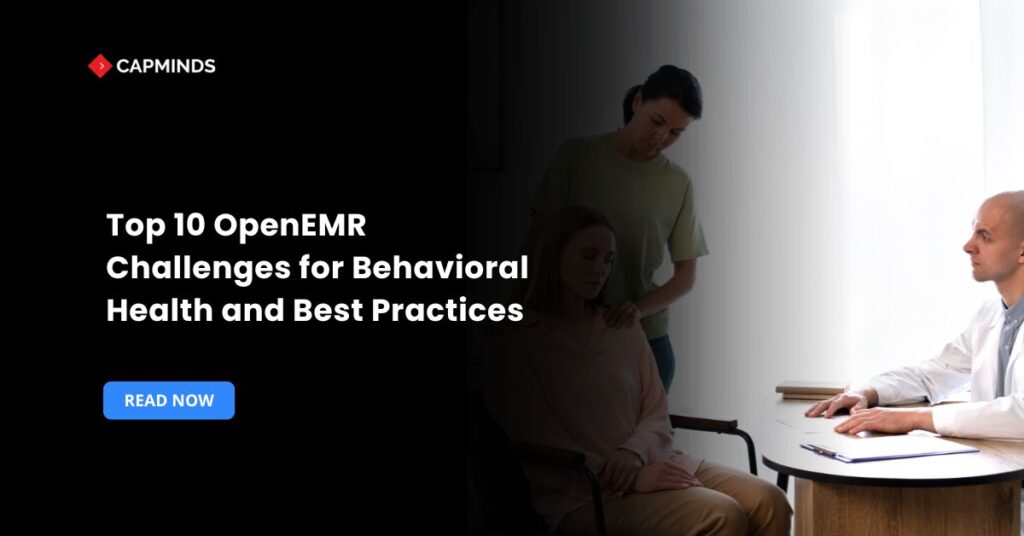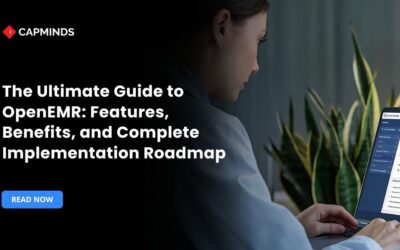Top 10 OpenEMR Challenges for Behavioral Health and Best Practices
Behavioral health practices have distinct complexities that set them apart from typical medical settings, including confidentiality issues, complicated documentation needs, and the need for integrated care coordination, to mention a few.
In this blog, you’ll learn the top 10 challenges that behavioral health professionals face and how you can use OpenEMR‘s tools and modules to tackle them while optimizing clinical processes, assuring compliance, and ultimately improving patient care.
10 OpenEMR Challenges for Behavioral Health
1. Lack of Behavioral Health-Specific Templates
OpenEMR’s default clinical templates are intended for general medicine, which frequently leaves behavioral health clinicians without the specific data they require. Behavioral health practitioners require forms such as SOAP, BIRP, DAP notes, mental status exams, suicide risk assessments, and treatment plans that are suited to cognitive and emotional evaluations.
Without these pre-built templates, physicians must spend more time writing or editing forms, resulting in inefficiencies and discrepancies in clinical documentation.
Solution:
- OpenEMR’s form builder allows you to design custom SOAP, BIRP, DAP, and MSE forms.
- Use community-contributed mental health templates.
2. Integration of Psychometric Tools
Behavioral health therapy typically uses validated scales such as the PHQ-9, GAD-7, ASAM, and others to assess mental health state, track progress, and make treatment modifications.
OpenEMR does not provide built-in integration for these psychometric instruments, nor does it make it easy to record their scoring patterns. This lack of integration restricts the clinician’s ability to use structured evaluation data for treatment planning or reporting to payers and regulators.
Solution
- PHQ-9, GAD-7, and other comparable instruments may be embedded or linked using LBF forms or external modules.
- Scoring data should be stored and tracked inside the patient chart for trend analysis.
3. Limited Support for Group Therapy Scheduling
Many mental health facilities provide group therapy sessions for substance addiction and trauma recovery. OpenEMR’s calendar and schedule components are designed for one-on-one appointments rather than allocating several patients to a single therapist or therapy group.
Workarounds such as manually arranging several appointments are time-consuming and error-prone, frequently resulting in scheduling conflicts or administrative burden.
Solution
- Manage group appointments using calendar categories and custom modules.
- Set up color-coded scheduling and patient labeling.
4. Inadequate Workflow for Case Management
Unlike general practice, behavioral health frequently requires multidisciplinary collaboration among therapists, case managers, social workers, and other organizations such as schools or community agencies.
OpenEMR’s workflow features do not natively allow multi-role collaboration, care coordination notes, or recording third-party participation. This lack of structure causes fragmented communication, making it difficult to deliver complete, coordinated treatment.
Solution
- Create custom processes and communicate with providers using OpenEMR’s messaging module.
- Use patient flags or reminders to help with follow-ups and case management responsibilities.
5. Documentation Compliance
Behavioral health providers are required to follow tight documentation standards owing to payer restrictions, audit concerns, and regulatory requirements. It is vital to keep treatment notes up to date, document consent, check progress, and revise goals.
OpenEMR does not enforce these regulations automatically, requiring providers to remember and maintain compliance manually. This opens the door to potential errors, denied claims, or legal complications.
Solution
- Set reminders and enforce standards for treatment note completion deadlines.
- Track patient permission via digital signature plugins or scanned uploads.
Related: Supporting Population Health, CCM, and Behavioral Care with a Customizable OpenEMR Framework
6. Medication Management Limitations
Psychiatric drugs frequently include complex dose regimens, interactions, and long-term side effects. OpenEMR’s standard medication management system lacks advanced features such as automated drug interaction checks, longitudinal medication tracking, and adherence monitoring tools.
For patients taking many drugs or suffering from treatment-resistant illnesses, this constraint raises the danger of incomplete data and less informed therapeutic judgments.
Solution
- Utilize medication reconciliation and provide notifications for allergies and potential drug interactions.
- Monitor long-term psychotropic usage in the issue list and care plan.
7. Telehealth Integration Gaps
Behavioral health has quickly adopted telehealth; however, OpenEMR’s telehealth capabilities are limited without third-party interfaces. Some plugins exist; however, they are not necessarily smooth or HIPAA-compliant.
Providers must switch between systems for scheduling, video consultations, and documentation, which disrupts workflows and reduces continuity in the virtual care experience for patients.
Solution
- Link HIPAA-compliant platforms such as Zoom for healthcare via a patient portal or appointment reminders.
- Document telehealth sessions using the relevant visit codes.
8. Data Security for Mental Health Records
Behavioral health records sometimes include very sensitive information, such as trauma histories, substance use disclosures, or psychiatric diagnoses. These need additional data protection beyond standard HIPAA compliance.
OpenEMR, while secure, requires human configuration to comply with heightened privacy rules such as 42 CFR Part 2. Misconfigurations or missed settings might result in security vulnerabilities or compliance issues.
Solution
- Set up role-based access control, enable two-factor authentication, and enable audit logging.
- Follow encryption best practices and make frequent backups.
9. Billing for Complex Behavioral Healthcare Services
Behavioral health billing includes CPT codes for therapy sessions, intake evaluations, telemedicine, drug abuse treatment, and group therapy. These are frequently time- or outcome-driven, adding complexity.
The billing engine in OpenEMR is not pre-optimized for mental health coding regulations; therefore, extensive modification, staff training, and rule settings are required to ensure valid claims and reduce denials.
Solution
- Add CPT/ICD codes for treatment, substance use, and mental health.
- Automated billing rules can help decrease human claim mistakes.
10. Reporting and Outcome Measurement Deficits
Outcome tracking and data-driven treatment are becoming more significant in mental health, particularly in value-based care models. However, OpenEMR’s native reporting features are primarily focused on general metrics such as visits and invoicing, rather than mental health outcomes.
Clinics must utilize external tools or tailor SQL reporting to track therapy objectives, patient progress, and no-show trends, which requires technical expertise that is not always accessible in-house.
Solution
- Use SQL queries or third-party tools such as Power BI to connect to the OpenEMR database.
- Monitor results, no-show rates, therapeutic objectives, and patient satisfaction.
Related: Custom EHR/EMR for Behavioral Health: A Complete Roadmap from Development to Implementation
CapMinds OpenEMR Customization and Integration Service
CapMinds OpenEMR equips clinicians with the best features and ways to integrate. It makes their workflows more efficient and filtered.
The integrated features will allow them to combine the ability of patient record management with conceptual and concurrent reminders.
This enhances the process of decision-making and improves patient care and quality.
- At CapMinds, OpenEMR custom solutions are developed with much care and accuracy to match the special practice needs.
- It will be low-cost and the perfect budget solution for your practice’s long-term future.
- CapMinds OpenEMR prioritizes secure data management & ensures compliance with industry regulations, offering healthcare providers peace of mind.
Get the best technologies and HIPAA-compliant and efficient OpenEMR from CapMinds that can be tailored to fit your practice.
Our OpenEMR services facilitate a Modern User Interface (UI), customization, production support, and training. They also facilitate billing, reporting, specialty enhancements, clearing house integrations, e-prescribing, and cloud services.
“Get the most experienced, proven, and perfect professional support for your OpenEMR.”




